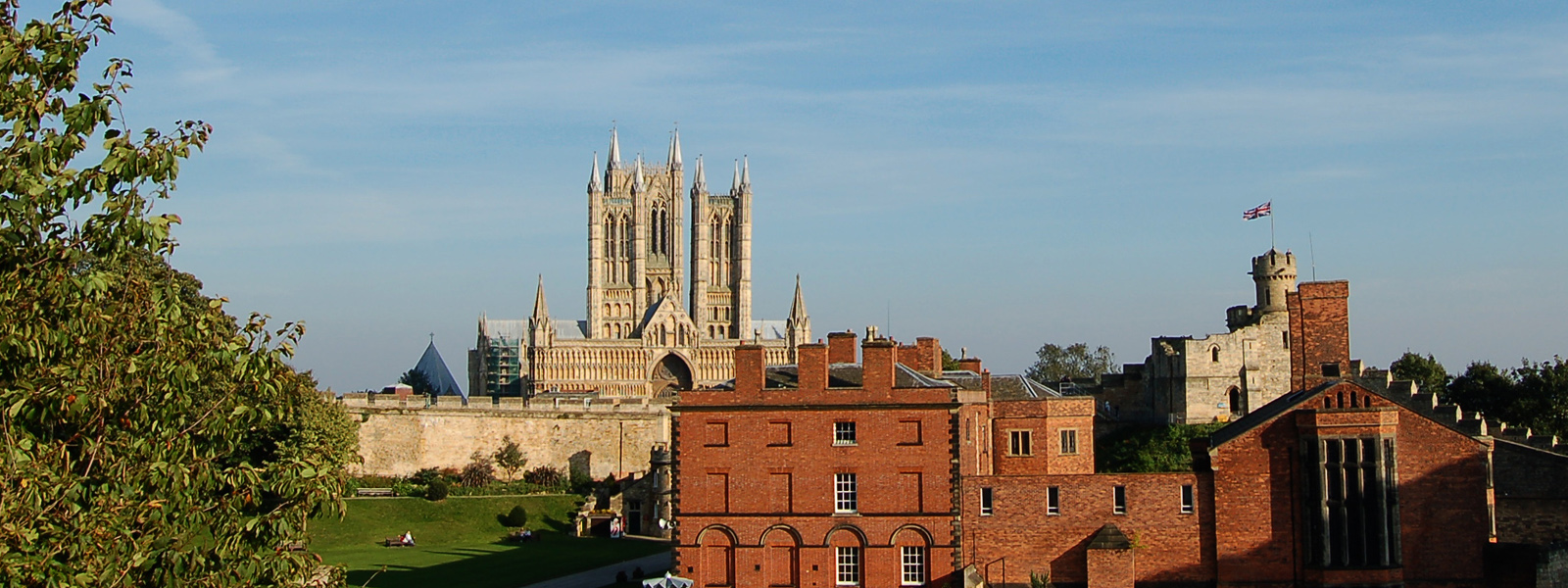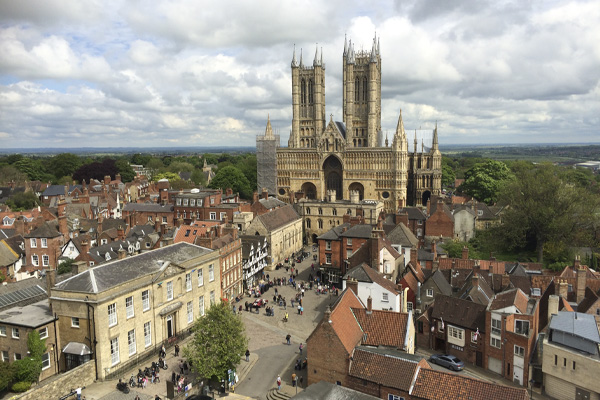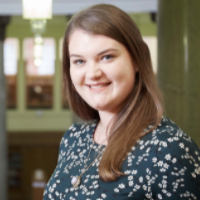Module Overview
In this module, you can learn the basics of how medieval people expressed themselves in Latin, and trace how that expression developed over time from the Classical language of Cicero and Virgil to the Romance languages of Western Europe. You are also able to read some of the writings of a wide range of medieval people, from the fourth-century nun Egeria, who left us an account of her pilgrimage from Spain across the Mediterranean to the Holy Land, to the thirteenth-century philosopher Roger Bacon, who formulated the scientific method and argued for a universal grammar underlying all language. This module is runs over two semesters, and aims to give you the tools to interpret medieval Latin texts and documents for yourself in the original, and to read English translations with a critical eye.
Module Overview
This module aims to explores the city as a central element in the study of medieval history and culture. You are able to investigate Lincoln as both “urbs” (physical space) and “civitas” (people and communities). Starting with the analysis of the urban fabric (“urbs”), you can explore the transformations of the city from the Roman era through the Viking and Anglo-Saxon periods to the later Middle Ages. You can also focus on the memory of its inhabitants, exploring topics such as commemoration, domestic spaces, identities, and legends. The final part of the module considers the activity of institutions in the city, focusing on education, urban government, and the law (including Magna Carta), and exploring the significance of Lincoln’s royal castle and the Cathedral in times of peace and war. This module may include field trips to some of the historical sites under scrutiny.
Module Overview
The module is designed to provide an introduction to the practical techniques of reading medieval documents, including the use of standard abbreviation forms in documents, the use of standard phrasing in administrative documents, and the development of this practice in large administrations (including royal and ecclesiastical chanceries). This module introduces an essential skill for medievalists and gives students the opportunity to engage with medieval sources in their original form.
Module Overview
This module is designed to help you develop and enhance the essential skills for an advanced study of historical and literary texts, visual, material, and archaeological sources, while also familiarising you with a wide range of research methods used within Medieval Studies. You may have the opportunity to use medieval manuscripts from the Lincoln Cathedral Library and handle documents available at the Lincolnshire Archives’ unrivalled collections of medieval records. You are able to engage with fundamental research processes, such as gathering, evaluating, and analysing data of various sorts, reflecting on both quantitative and qualitative information. This module includes field trips to visit some of the exciting sites and sources under scrutiny.
Module Overview
This module introduces key issues and concepts in gender history, with particular reference to early modern masculinity. An introduction to key ideas and scholars is provided, focussing particularly on the ways in which scholars of the history of masculinity use a variety of texts – from journals and letters to visual material and published works – in order to elucidate the ideals and experiences of both early modern men and women.
The module offers students the opportunity to engage in sustained analysis of developments in scholarship relating to masculinity in the period c.1500-1750. This is designed to enable them to demonstrate their understanding and ability to structure their own research, utilising primary and secondary sources, including works from cognate disciplines such as gender theory and other theoretically-informed approaches.
Module Overview
This module focuses on the ‘fall’ of the Roman Empire in Western Europe in the late fifth century and the emergence of the post-Roman kingdoms. You can examine the central place of ‘barbarian’ peoples, from the Huns and the Goths to the Franks and the Anglo-Saxons in this period, also paying particular attention to the role of churchmen, as spiritual leaders and local powerbrokers, in managing the transition from Roman rule. You are able to read a wide range of written sources, including histories, chronicles, and laws, also engaging with the extensive archaeological record for the period.
Module Overview
Few places in Europe experienced as culturally diverse and politically complex a medieval past as did the Iberian Peninsula. Indeed, as Janna Bianchini has pointed out, the study of medieval Spain and Portugal obliges us to confront ‘the rich and sometimes violent interchange of (at least) three cultures and religions.’
This module allows students the opportunity to explore multiple aspects of the history of Spain and Portugal from 500 to 1300. This module is team taught, making use of Lincoln's research cluster in medieval Iberian studies, with the aim of ensuring that students are at the forefront of the discipline.
Module Overview
‘The Mediterranean is not merely geography’ (Matvejević, 1999). Spanning History, Art History, Architecture, and Literature, this module offers an insight into the complexities of a medieval Mediterranean world defined by both local and global dynamics, cross-cultural encounters, exchanges, and communication. Focusing on the period 1000-1500, you can explore how people, goods, practices, and ideas circulated and interacted in times of war and peace: from Norman Sicily and the Latin East, through Italy and Iberia, to the Spanish territories in the Americas. This module will also help you discover how religion, gender, race, and social status had an impact on Mediterranean networks of power and communication.
Module Overview
The Tudor and Stuart periods were times of riot, rebellion, and revolution. Monarchy was challenged, abolished, and restored; parliaments grew in authority and regularity; England and Scotland became a United Kingdom. It was also a time of rapid change in the depth and quality of political engagement and activity for people across all levels of society: it was an age of mob demonstrations, mass petitioning, printed satires, and armed rebellions. While historical studies have long recognised the constitutional and political significance of this period, the approaches taken by historians have evolved substantially in recent decades. The module allows students to investigate the history of monarchy, parliaments, and the state, as well as the issue of ‘popular politics’, and the ways in which men and women outside of the political elite engaged with those in authority. It offers the chance to develop skills in locating, accessing, and reading early modern printed and manuscript sources and to engage with Lincoln’s rich early modern archives.
Module Overview
Why does the study of emotions matter? How shall we approach it? This module brings together social and cultural history, alongside the histories of emotions and the senses, to study how emotions, along with their embodiment and rhetoric, were conceived, manipulated, and adopted, by whom and in what contexts. Love, anger, hatred, and fear are some of the themes that will be discussed in the context of Western Europe and the Mediterranean between 1000 and 1400, a period when their meanings and values were often astonishingly different from our modern conceptions. Primary sources under examination can include letters, philosophical and medical treaties, narrative and literary sources, ecclesiastical writings, as well as visual art and material culture.
Module Overview
This module examines what outlaw figures, and especially Robin Hood, meant to the people of Britain in the Middle Ages, as well as how he was, and still is, connected to history and myth in literature. You can consider the glorification of crime associated with outlaw narratives and the associated resistance of primarily clerical and state authority, as well as the underlying homosocial bonds present in outlaw communities. You are also able to examine other prevalent themes, including human relations with the natural world, gender, religion, disguise and trickery, class, warfare, and weaponry. Finally, you can explore how outlawry and outlaw figures (especially Robin Hood) have been reimagined in post-medieval periods and in modern media. Materials studied range from medieval chronicles, ballads, and dramatic texts to Victorian poetry, children’s literature, film, and television
Module Overview
This module examines the relationship between saints and the societies from which they emerged. Through a series of case studies, it explores the evolution of Christian concepts and practices of sanctity in late antiquity and the early medieval period, before exploring a range of case studies from across later medieval Europe, including some examples from Lincoln and Lincolnshire. You will be encouraged to engage with a range of different sources, including hagiography, material culture, liturgy, and theology in order to understand the phenomenon of the cult of the saints. In the process, we open a fascinating window onto the thought world and social experiences of medieval men and women.
Module Overview
King Henry III’s reign (1216-72) was tremendously significant for the English monarchy. The 9-year-old Henry inherited the throne during a bitter civil war. Although the battles of Lincoln and Sandwich (1217) secured Henry’s position, the following years were eventful. Henry’s marriage to Eleanor of Provence (1236) and his favouritism towards his half-siblings led to court factionalism, with his unpopular policies culminating in England's first revolution. During baronial rebellion in 1258-65, Henry III was reduced to a cipher, the queen spent time in exile, and a baronial council led by Henry's brother-in-law, Simon de Montfort, took control. Yet the baronial movement ultimately collapsed, following de Montfort's brutal death at Evesham. Employing chronicles, letters, and other records, you can explore the relationship between the king, queen, and aristocracy through contemporary eyes.






